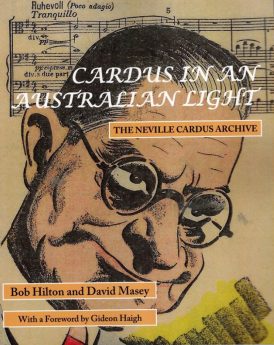Cardus in an Australian Light
Martin Chandler |Published: 2021
Pages: 137
Author: Hilton, B and Masey, D
Publisher: Lancashire CCC Library/Max Books
Rating: 3.5 stars

It never ceases to amaze me that there are some people, undoubtedly genuine cricket lovers, who revile the work of Neville Cardus. There is, I suppose, simply no accounting for taste and many, many more revere the man whose style (and even his detractors have to concede this) changed cricket writing forever.
So I will, just in case they have got even this far, issue a quick summary for the Anti-Cardus brigade; There is nothing for you here – press the back button now.
For the rest of us the publishers have, very wisely in view of the subject matter of the book, persuaded the most recent of Cardus’s anthologists, Gideon Haigh, to write a perceptive foreword which contains the telling observation that Cardus retained a popularity in Australia long after his star in England had rather waned.
Cardus’s relationship with matters Australian began when he watched Victor Trumper score his famous century before lunch in the Old Trafford Test of 1902, and he reported on all the Ashes series in England between the wars, as well as visiting Australia to report on Gubby Allen’s series there in 1936/37.
The next visit to Australia for Cardus, in September 1939, was a rather longer one as he remained in the country for the duration of World War Two, although he was back in England in time to watch Don Bradman’s all-conquering Invincibles in 1948.
Cardus in an Australian Light is the latest in a number of recent publications from The Neville Cardus Archive and is certainly the most ambitious in terms of both production quality and size.
An important question with anything about Cardus is what more is there that can be said about a man who wrote three autobiographies and has been the subject of a number of other books, most notably Duncan Hamilton’s masterful biography, The Great Romantic, that was published as recently as 2019 and Christopher O’Brien’s Cardus Uncovered (2018 and 2020)?
In terms of Cardus the man the answer to that question is ‘not a great deal’, and whilst there is biographical background throughout the book there are no great revelations. What is more important therefore is the look at Cardus’s body of work, either about Australia, or created when he was taking his long sabbatical there.
Much of Cardus’s work during the war years was concerned with his other great love, music, and there is rather more on that subject than is usually found in the many examinations of his life that have appeared over the years, and in that respect the reader is reminded that by the end of the war Cardus’s expressed intention was to give up his day to day cricket reporting in order to concentrate on writing books and his role as a music critic.
Despite his stated ambitions Cardus did however report on the 1946/47 Ashes series and the real ‘coup’ in Cardus in an Australian Light is that more than a quarter of it is taken up with an abridged version of Cardus’s reports on England’s 3-0 defeat, the first time that those reports have appeared in book form.
His preference for music notwithstanding Cardus’s prose on the series is well up to his usual standard. Of the famous incident in the first Test when Bradman was adjudged not out when almost all in the ground thought he had been caught at slip by Jack Ikin from the bowling of Bill Voce his comment was; the umpire rejected the appeal and that was that. Australian umpires, by the way, wear short white coats, which lend to them a suggestion of much efficiency, but whether as umpires or dentists I am unable to decide in this heat which is rather softening to the intellect.
Later on, during a rare moment of English success on the third morning Cardus wrote of leg spinner Doug Wright removing Johnson and McCool as unceremoniously as a waiter clears away empty bottles the morning after.
In truth Cardus in an Australian Light is probably only for the hardened Cardus fan, or those interested in that long forgotten post war tour, but I am sure there are enough of those to ensure that the 250 copies of this one sell out promptly – copies are available through the Max Books website.






Leave a comment